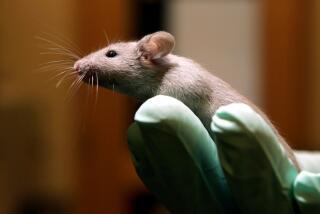Mice Created by Cloning Have Shorter Life Spans, Study Finds
- Share via
Cloned mice die earlier than mice conceived in natural ways, according to research that suggests that cloning causes subtle abnormalities that may not be immediately detectable in animals that look healthy.
The study is small in size and thus not definitive. But it is the first to examine the life span of cloned creatures. It joins several earlier studies that reported defects in cloned animals that survived to birth. Those defects include abnormal body sizes and placentas as well as possible immune system problems. Some research also has suggested that a cellular structure that is related to aging may be abnormal in clones.
Scientists say the research, published in the journal Nature Genetics, is one more piece of evidence that the genes of cloned creatures--because they come from adult cells instead of eggs and sperm--may not be properly reprogrammed, leading to an array of developmental glitches.
“I’m not surprised at all,” said Dr. Rudolf Jaenisch, professor of biology at the Whitehead Institute and the Massachusetts Institute of Technology, who has cited safety concerns in his public opposition to the cloning of humans. “It has exactly confirmed my strong belief and that of others. I think that most clones, if not all, have subtle defects.”
But in a commentary that accompanied the report of the new research, scientists who support more aggressive efforts to develop clones argued that the problems may be more a matter of current methods of cloning than an intractable biological barrier.
Today’s cloning methods, involving elaborate microsurgery to add and remove DNA to cells, “are potentially traumatic” to the cells, said Tony Perry, a molecular embryologist at Advanced Cell Technology Inc., a Worcester, Mass., company involved in cloning research. “Maybe we can improve the techniques,” he said.
Cloning technology involves removing genetic material from an egg and replacing it with DNA from another cell. This results in creatures that are clones--genetically identical to the animal that donated the DNA.
Many scientists hope that clones will someday supply tissues for the repair of organs. The prospect of using cloning to create human babies is much more controversial. Most cloned embryos do not survive to birth and those that do often die soon after.
The new study was conducted by Japanese scientists led by Atsuo Ogura of the National Institute of Infectious Diseases in Tokyo. The researchers compared 12 mice created by cloning with seven derived from natural mating and six derived by injecting DNA from an immature sperm cell into an egg.
The scientists monitored the animals’ weight and blood chemicals. The cloned mice, which were genetically the same as the other two groups, had higher blood levels of ammonia and a liver enzyme in their blood, suggesting that their livers weren’t functioning properly.
They also died prematurely. At 800 days after birth, 10 of the 12 cloned mice were dead. Only one of the group derived from natural mating and two from the injected group had died during this time period.
Post-mortem examination of six dead cloned mice revealed that all had severe pneumonia, four had severely damaged livers and two had cancerous tumors.
“The possible negative long-term effects of cloning . . . give cause for concern about attempts to clone humans for reproductive purposes,” the authors concluded.






